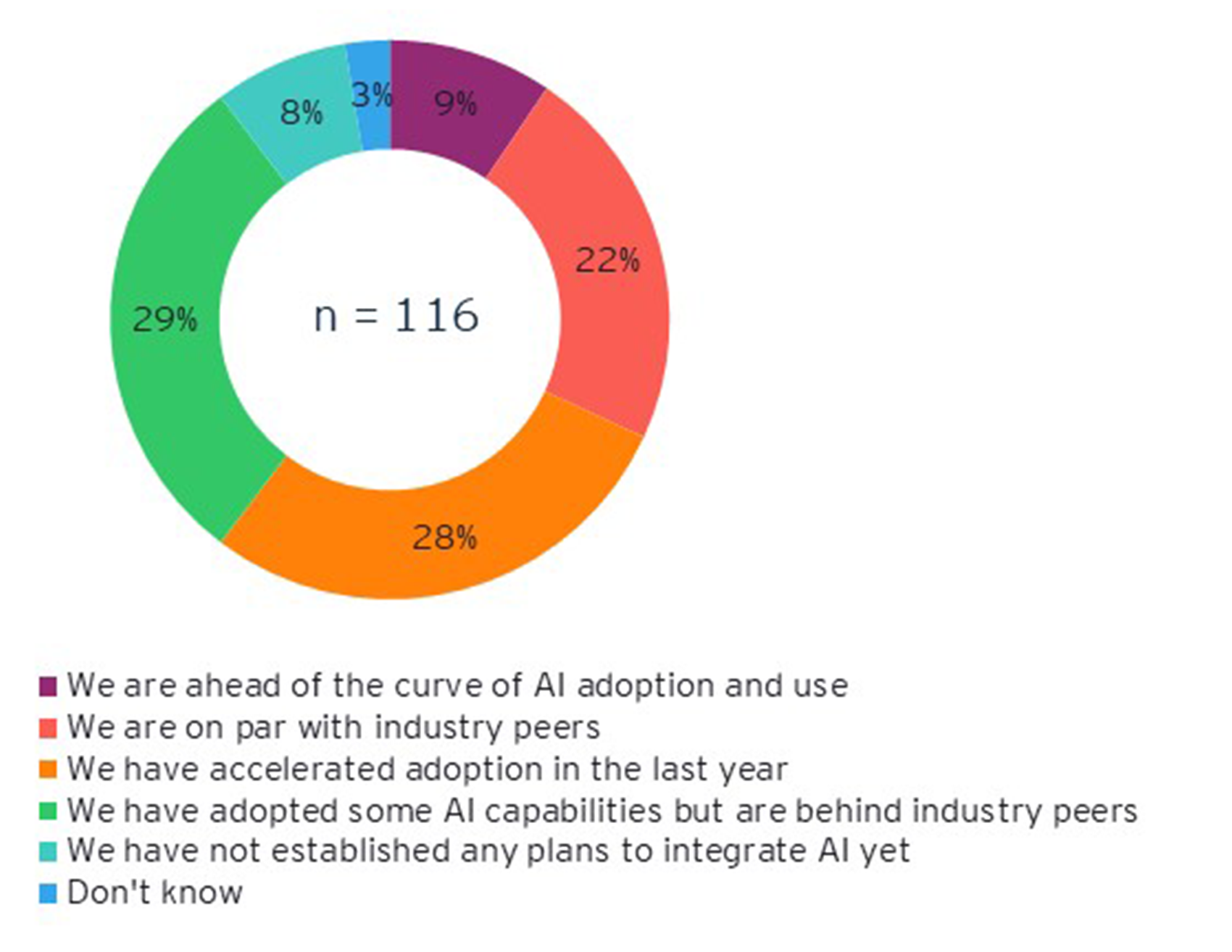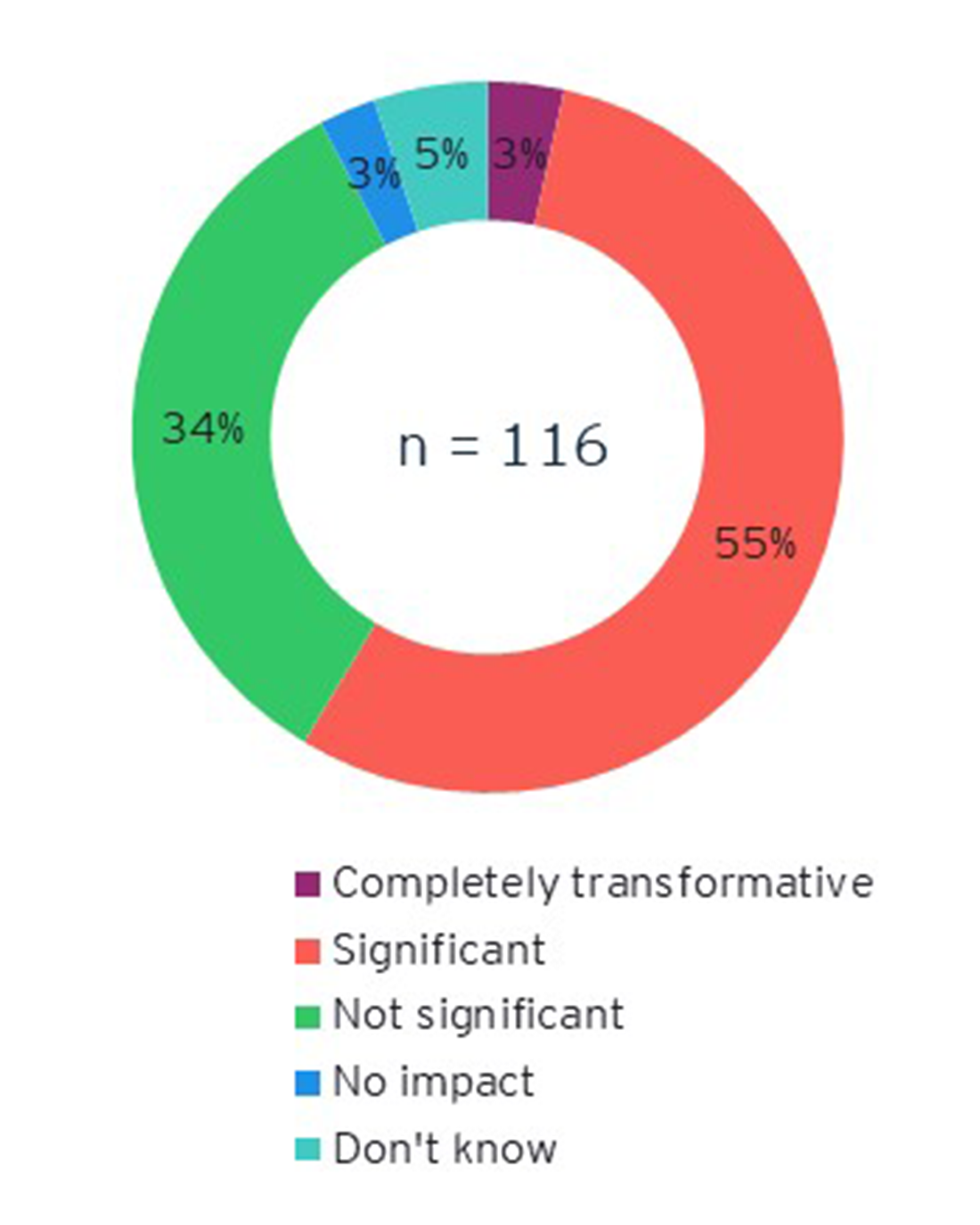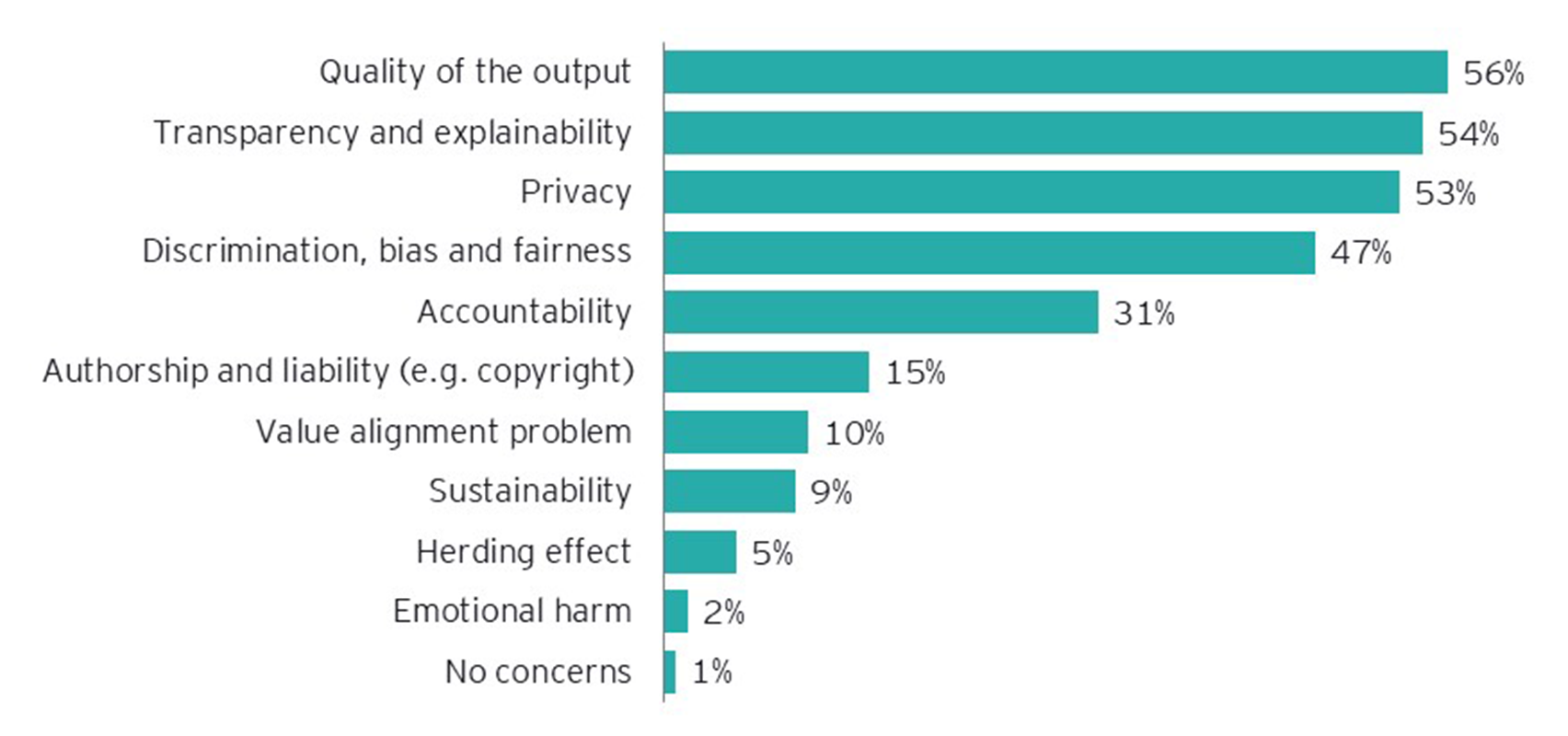EY refers to the global organization, and may refer to one or more, of the member firms of Ernst & Young Global Limited, each of which is a separate legal entity. Ernst & Young Global Limited, a UK company limited by guarantee, does not provide services to clients.

The EY European Financial Services AI Survey reveals GenAI adoption struggles due to skill gaps, regulatory readiness, and ethical concerns.
In brief
- The EY survey shows only 25% of firms have GenAI training programs, highlighting a critical need for upskilling.
- Most firms are in early stages of AI adoption, struggling to integrate GenAI use cases and keep pace with advancements.
- Only 11% of firms are prepared for incoming AI regulations, with many lacking a comprehensive AI regulatory risk framework.
Executives across Europe’s financial services sector continue to integrate Artificial Intelligence (AI) and Generative AI (GenAI) technologies into their operations to achieve productivity and efficiency uplifts, according to the second EY European Financial Services AI Survey, but only 9% rank themselves ahead of the curve. Whilst executives’ aspirations for a more AI-enabled business are high and 28% say they have accelerated overall AI adoption over the last year, most firms remain in the early, experimental stages, especially when it comes to GenAI.
The new survey data, which canvassed the views of European financial services executives at over 100 firms representing an aggregate market cap of almost €880bn, finds that only 31% of firms across Europe believe they are on track with overall AI integration. Just 11% of executives say their firm is prepared for incoming AI regulation, and despite 78% acknowledging their workforce has only some, limited or no experience of the newest GenAI-related technologies only a quarter of firms have established new training and upskilling programs, with 60% still in the planning phase.
GenAI continues to sit high on the agenda for financial services executive committees, promising well-acknowledged new levels of productivity gain. There is little doubt within the sector that harnessing AI – and increasingly GenAI – is game-changing, but the implementation of an evolving technology, to budget, within risk appetite and across an entire workforce, is hugely complex and challenging. Whilst some firms have made huge leaps in adopting AI and have seen real benefits, many are struggling to keep pace.
GenAI is developing faster than many other technological innovations of recent times, and demands new, progressive skill sets. The firms that ramp up regulatory preparations, build an appropriate risk and control framework, and roll out essential new training and upskilling programs across their whole workforce – not just to the technical few – will be setting themselves apart from the competition. Companies see the increasing importance of having a central AI team (CoE, lab, …) to better organize themselves. However, as many AI capabilities can also be deployed within the business teams where the skills are not yet sufficient, more and more departments also start planning training programs to understand and use the AI systems made by the AI CoE but also to develop their own solutions.

AI could impact up to a third of Europe’s finance roles – especially at entry-level
The majority (66%) of executives surveyed believe that over the next year up to a quarter (25%) of current European financial services roles could be impacted by ongoing AI integration, and 93% of executives say up to 10% of roles could become redundant. Despite this, only a quarter (25%) report their firm has an established training programme in place, 43% say plans are still in their infancy, and 29% confirm they currently have no training programs in place – 12% of whom say they have no plans to develop one.
Entry-level positions are expected to be particularly impacted, with 59% of executives believing AI technologies will have a significant or even transformative impact on the roles and tasks undertaken by those joining the workforce. Despite this, only 24% of executives are planning to restructure entry-level roles and responsibilities, and just 25% plan to integrate AI training within their graduate program (down from 35% in 2023). Thirty-five percent say they have not taken any action to offset any potential knock-on impacts of AI adoption to the junior workforce (up from 28% in 2023).

New areas are demanding AI expertise, and adaptability is the most important attribute for new hires
While, last year, the IT departments quickly recognized the potential of AI for software development, we are currently witnessing the rise of a significant new trend within financial institutions: back-office operations are increasingly seeking AI-proficient resources. Notably, back-office operations have surged from third place last year to become the second most demanding area for AI competencies, with 46% of respondents expressing this need, a significant increase from 14% in 2023. IT follows closely, with 40% of respondents in 2024, up from 24% in 2023, highlighting the growing importance of AI expertise across various business domains.
When asked to consider the top attributes that firms will seek as they recruit entry-level talent for an AI-enabled workforce, the top three cited by European financial services executives were the ability to adapt (77%), having an innovative and experimental mindset (70%), and the ability to collaborate and work outside their focus area (44%). This year, being tech-savvy did not rank as a top priority (34%).
European finance executives plan to increase capital allocation to GenAI specifically
The survey data confirms that GenAI-driven investment remains central to European financial firms, with 72% of executives planning to increase expenditure over the next six to 12 months. This is marginally lower than the 75% of executives in 2023 who said they would actively invest in GenAI in the year ahead.
Executives voice growing concerns over GenAI integration and regulatory readiness
Focusing on GenAI specifically, the two biggest concerns according to executives when it comes to integrating the technology remain the same as last year. European finance executives cite limited understanding and experience of GenAI applications and the impact across the workforce (56% in 2024, up from 36% in 2023), followed by uncertainty about existing and pending potential regulatory impacts (38% in 2024, up from 29% in 2023). Ethical issues – which were ranked third in 2023 have fallen to eighth place, and executives are now more concerned about the speed of evolution of GenAI progress compared to how fast they can integrate it into their business (35%), followed by cost of implementation and control frameworks (26%).
In reference to the broader AI landscape, only 11% of executives stated that their firm is fully prepared for incoming regulation, while 70% say their firm is only limited or partially prepared, and 15% do not even have an AI regulatory risk framework in place.
In Belgium, readiness for AI regulation is lagging, with the biggest banks and insurance companies being the most prepared.
Ethics in GenAI integration
On GenAI specifically, executives continue to raise concerns about ethics. The top concern in 2024 for GenAI adoption is the quality of output (cited by 56% of all respondents), followed by transparency and explainability (54%), privacy (53%), and the potential for discrimination, bias, and lack of fairness (47%). To manage potential ethical implications arising from GenAI integration, 14% of respondents claimed they have already put an overall AI ethics framework in place, with a further 31% in the early stages of development. However, a quarter (25%) of respondents stated their firm is yet to develop an AI ethics framework, and 24% said they have no plans to develop one.

In Belgium, most companies (80%) declared that their top concern is discrimination, bias, and fairness with AI. This contrasts with European companies, whose primary concerns are the quality of the output and its transparency.
A Belgian perspective
The Belgian market mirrors the European trends: most companies have accelerated their AI adoption over the past year. Yet, 50% of respondents feel they are lagging behind their industry peers, and 70% believe AI will have a significant impact. Similar to their European counterparts, Belgian companies are cautious with GenAI, primarily focusing on internal activities like IT, Finance and Legal or even HR. This year, we are also seeing more use cases related to customer experience and customer-facing services. In Belgium, there is a stronger belief that AI will greatly enhance employee experience by managing the increasing operational demands and enabling a focus on value-added tasks.
EY Belgium newsletter
Subscribe to our monthly newsletter and stay updated on our latest insights.
Related articles
How embedded finance and AI impact the lending sector
Several trends are currently gaining momentum in lending, transforming the industry and bringing a series of opportunities.
How your organization can have confidence in the opportunities AI brings
As interest in ethical AI explodes, the debate is shifting away from “trust” and towards “confidence”, helping unlock valuable use cases. Learn more.
Summary
The EY European Financial Services AI Survey reveals that while many firms have begun integrating AI and GenAI, significant challenges remain. Limited understanding, regulatory readiness, and ethical concerns are major hurdles. Most firms are still in the early stages of adoption, with only a small percentage fully prepared for upcoming regulations. The survey underscores the need for increased investment in training and upskilling programs to harness the full potential of GenAI and stay competitive in the evolving financial landscape.


